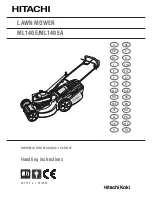
3.4.3.1 To put the boundary wire in a slope
The product can operate in slopes. Slopes that are too
steep must be isolated with the boundary wire. The
gradient (%) is calculated as height per m. Example: 10
cm / 100 cm = 10%.
10 cm/4"
100 cm/40"
10%
•
For slopes steeper than inside the work area,
isolate the slope with boundary wire.
•
For slopes steeper than 10% along the outer edge
of the lawn, put the boundary wire 20 cm / 8 in. (A)
from the edge.
A
>10%
0-25%
•
For slopes adjacent to a public road, put an
obstacle of minimum 15 cm / 6 in. along the outer
edge of the slope. You can use a wall or a fence
as an obstacle.
3.4.3.2 Passages
A passage is a section that has boundary wire on each
side and that connects 2 parts of the work area. The
distance between the boundary wire on each side in the
passage must be a minimum of 60 cm / 24 in.
Note:
If a passage is less than 2 m / 6.5 ft. wide,
install a guide wire through the passage.
The recommended minimum distance between the
guide wire and the boundary wire is 30 cm / 12 in. The
product always runs to the left of the guide wire as seen
facing the charging station. It is recommended to have
as much free area as possible to the left of the guide
wire (A).
>2 m / 6.5 ft
A
>30 cm / 12"
>60 cm / 24"
3.4.3.3 To make an island
CAUTION:
Do not put a section of
boundary wire across the other. The
sections of boundary wire must be parallel.
CAUTION:
Do not put the guide wire
across the boundary wire.
CAUTION:
Isolate or remove obstacles
that are less than 15 cm / 5.9 in. in height.
Isolate or remove obstacles that slope
slightly, for example, stones, trees or roots.
This will prevent damage to the blades of
the product.
To make an island, isolate areas in the work area with
the boundary wire. We recommend to isolate all stable
objects in the work area.
1411 - 007 - 23.09.2020
Installation - 15
















































